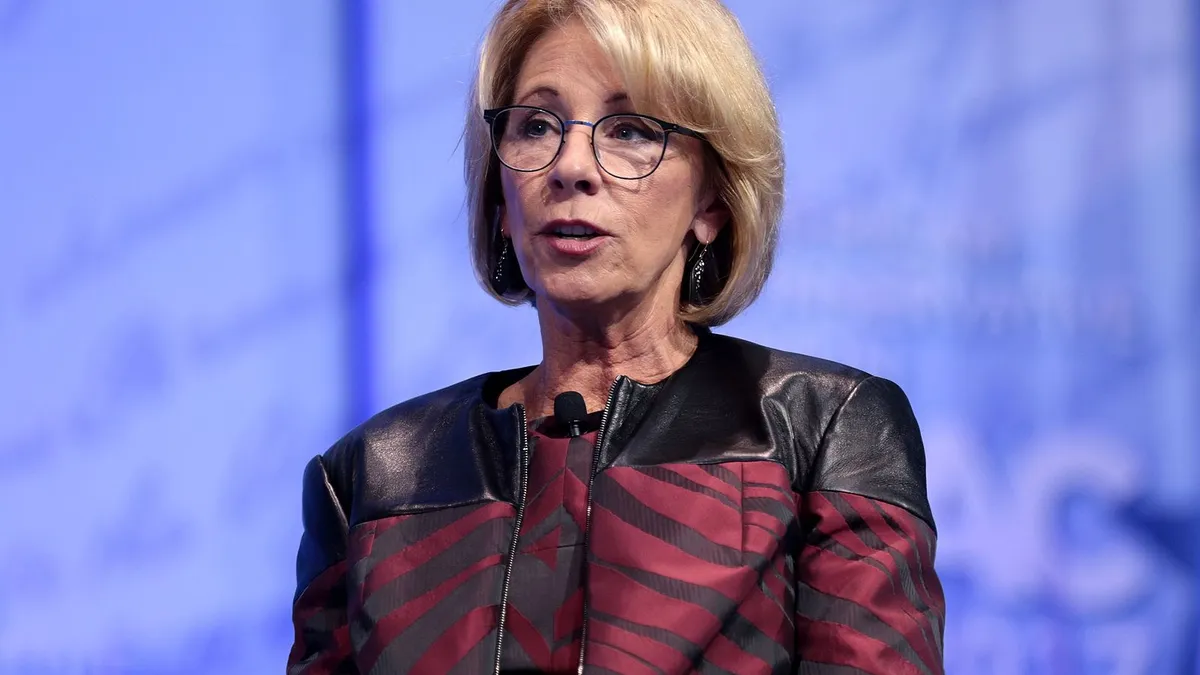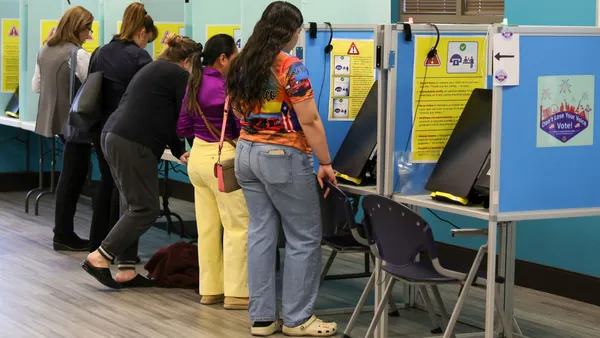Dive Brief:
- A committee convened by the U.S. Department of Education to negotiate an overhaul of college accreditation reached a consensus Wednesday on the text of new rules, the department said in a press release. The agency will publish the draft rules for public comment before issuing a final rule.
- Education Secretary Betsy DeVos said in a statement the new rules would "promote competition and raise standards" for accreditors, "put more teeth into teach-out plans and agreements to protect students from precipitous closures," better align higher ed with workforce needs and allow students to earn credit "for proving what they already know."
- The agreed-on changes would let colleges modify programs more quickly, speed up federal recognition for accreditors and "allow for more targeted, less comprehensive federal reviews of accreditors," Inside Higher Ed reported. The publication said stepping back some of its more controversial proposals helped the department reach consensus.
Dive Insight:
Critics observing the process had been skeptical that a consensus could be reached given the broad range of issues on the negotiating table, and some reported disorganization in the process. Inside Higher Ed noted that the agreement reached this week "marked the first time in nearly a decade" a negotiated rulemaking orchestrated by the department ended in a formal consensus on rules.
In her statement, DeVos saved a few words for skeptics of the process that started early in the year: "Everyone at the negotiating table ... overcame the naysayers to achieve consensus."
Critics on Wednesday took aim at both the process and the results of negotiated rulemaking. On Twitter, Clare McCann, deputy director for federal higher ed policy at the nonpartisan think tank New America, noted the Ed Department had voted to leave state attorneys general without a seat at the negotiating table. "[A]nd now, it's easy to see why. With effectively only one voice for student representatives on the (committee), ED forced consensus in the process," she wrote.
As a result of the #negreg, ED plans to allow accreditors to waive their standards to support "innovative" programs, allow institutions to operate without rigorous oversight, and weaken its own reviews of accreditors. 5/
— Clare McCann (@claremccann) April 4, 2019
To McCann, students and consumer protection advocates were left without strong representation in the process. She also noted that final rules allow accreditors to waive standards, institutions to remain out of compliance with requirements, and colleges to "buy new campuses by erasing most of the liability from what are often basically toxic assets and huge taxpayer liabilities."
Others took aim at the process, too. Noting the industry ties of negotiators tapped by the department, the Institute for College Access & Success said on Twitter that "stacking the deck leads to a false consensus."
The stated aim of the accreditation overhaul was to increase innovation in higher ed. DeVos said the "new policies and procedures will also work against unnecessary credential inflation that drives up cost and reduces the opportunity for low-income students to prepare for certain jobs."
Some in the industry hoped new rules could help clear the way to implement alternative models such as competency-based education and innovate with online programs. Others, who see the current system as already too lax for problematic colleges, were dismayed at proposals to loosen oversight of the industry.
Michael Itzkowitz, a senior fellow at center-left think tank Third Way and a former Ed Department official, told Education Dive earlier this year that some of the department's efforts could "open up the big bucket of federal student aid to unaccredited providers and untested programs that don't necessarily meet our current accreditation standards."
Others were more optimistic. Ned McCulloch, global issue manager for skill development and education at IBM and the negotiator representing employers, said on Twitter following the news of consensus that he was "proud" to vote for the new rules and that "education needs to be more inclusive and better aligned with jobs."
And Barbara Gellman-Danley, president of regional accreditor the Higher Learning Commission, called the consensus an "amazing achievement" in a Twitter post.














